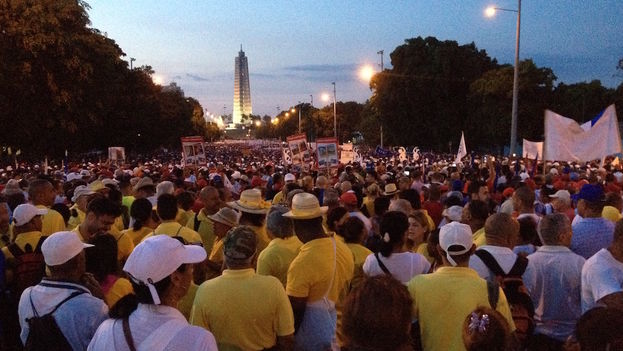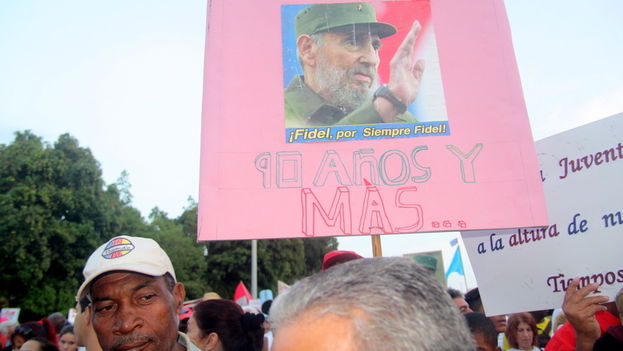
![]() 14ymedio, Zunilda Mata, Havana, 1 May 2016 — With the slogan “For Cuba: Unity and Commitment,” massive Labor Day parades were held across Cuba. The march in Havana’s Plaza of the Revolution started at 7:30 in the morning, with the presence of some 600,000 people and was marked by references to the recently concluded 7th Communist Party Congress and ex-president Fidel Castro’s 90th birthday, coming up in August.
14ymedio, Zunilda Mata, Havana, 1 May 2016 — With the slogan “For Cuba: Unity and Commitment,” massive Labor Day parades were held across Cuba. The march in Havana’s Plaza of the Revolution started at 7:30 in the morning, with the presence of some 600,000 people and was marked by references to the recently concluded 7th Communist Party Congress and ex-president Fidel Castro’s 90th birthday, coming up in August.
Among the thousands of posters on display, none addressed workers’ demands or wage increases. A peculiarity of the May Day parades that have taken place on the island for the last half century has been that their principle motivation was to show the commitment of professionals and workers to the political system.
On the podium greeting participants in the parade, which lasted about an hour and a half, were Cuban president Raul Castro, recently re-ratified in position as first secretary of the Cuban Communist Party (PCC); first vice-president Miguel Diaz-Canel Bermudez; Jose Ramon Machado Ventura, second secretary of the PCC Central Committee; and Ulises Guilarte de Nacimiento, director of the Cuban Workers Center (CTC), the only union organization permitted in the country, with a membership of 3.4 million state, private and retired workers.
In the speech that began the parade, Guilarte de Naciemiento, also a member of the Politburo, described as “maneuvers” the problems threatening several of the leftist governments of Latin America. In particular, the protests or legal processes challenging the executives in Venezuela and Brazil, as well as Ecuador, Bolivia, Nicaragua and El Salvador.
The union leader also referred to the process of normalization between the governments of Cuba and the United States, which he said could not be completed as long as “the economic, commercial and financial blockade against our country continues,” and as long as there is a US presence at the Guantanamo Bay Naval Base.
From the early hours of the morning, Havana workers from the city’s various districts and areas close to the Cuban capital began to gather. The majority of them were brought on buses belonging to their workplaces and some 3,257 vehicles that serve urban transport routes in the city.

The march was opened by a representation of 40,000 teachers in reminder of the Literacy Campaign which is celebrating its 55th anniversary this year. According to the official Cuban press, also participating were 1,600 guests representing 68 countries and 209 trade union organizations. However, unlike previous years the event was not attended by any foreign leader and on the foreign grandstand the highest ranking figure was a deputy of the Venezuelan ruling party, Elias Jaua.
“We will not forget history,” different speakers repeated at several moments to encourage the parade, a direct reference to Barack Obama’s speech in the Gran Teatro de La Habana, when the US president said he knew the history between Cuba and the United States but refused to be “trapped by it.” A reference that especially bothered the Cuban officialdom.
The parade proceeded as planned at the close of Party Congress last April 19, when Raul Castro called on workers to show “the world” through an “enthusiastic and massive participation,” their “unity and support for” the agreements reached at the Congress and “the socialist and independent course of the Fatherland.”
